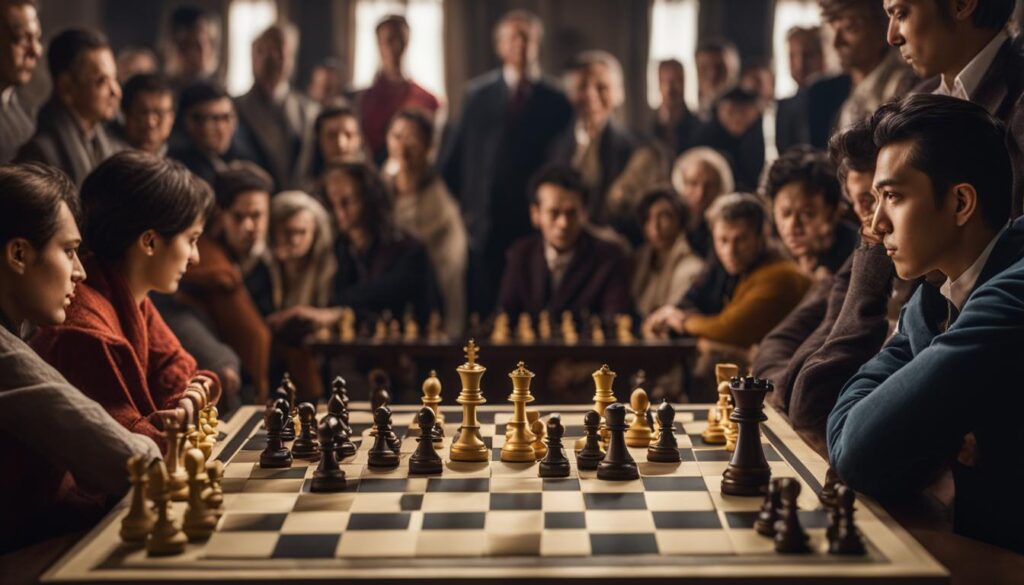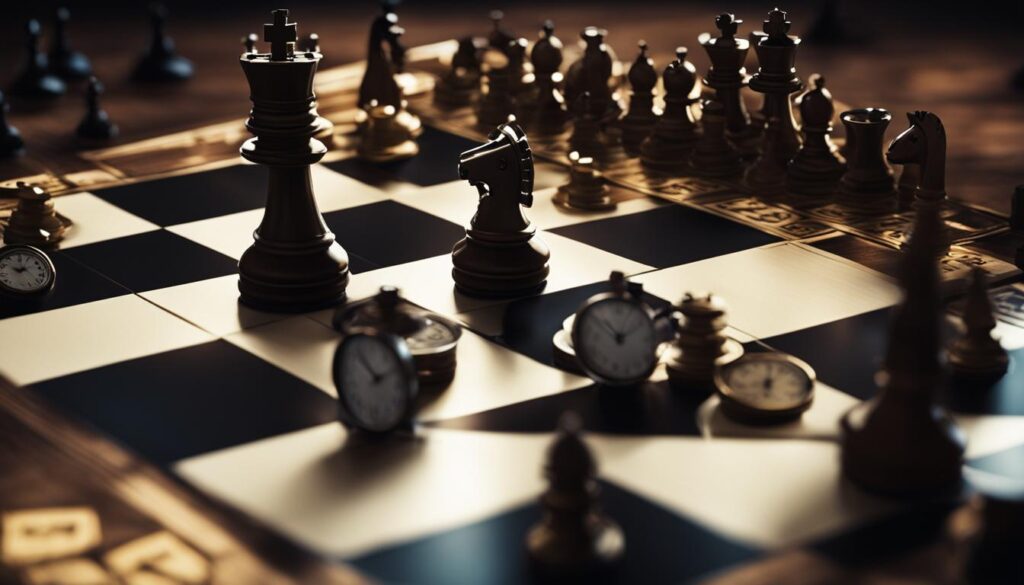We may earn money or products from the companies mentioned in this post.
Chess puzzles and challenges are essential tools for any chess player looking to improve their game. These puzzles are designed to test your chess skills and challenge you to think critically about the game. By solving puzzles and taking on challenges, players can improve their problem-solving skills, develop winning strategies, and master the game of chess.
Whether you are a beginner or an experienced player, incorporating puzzles and challenges into your regular training routine is a great way to enhance your chess skills and take your game to the next level.
Key Takeaways:
- Chess puzzles and challenges are crucial for improving chess skills and strategies.
- Solving puzzles enhances problem-solving and tactical skills.
- Puzzles help players recognize and execute different types of chess tactics.
- Puzzles also improve a player’s ability to plan and strategize their moves strategically.
- Online resources offer convenient and accessible access to numerous chess puzzles for all skill levels.
Enhance Your Problem Solving Skills with Chess Puzzles
Chess puzzles are a great way to enhance your problem-solving skills and take your chess game to the next level. Solving puzzles can help you develop your ability to think critically and strategically, which are essential skills for playing chess.
Chess problem solving requires a particular set of puzzle-solving techniques. Using these techniques, you can tackle even the most challenging puzzles with confidence. Here are some techniques to help you solve chess puzzles:
- Visualize the board: Picture the puzzle in your mind and visualize how the pieces move.
- Analyze the position: Look at the position of the pieces on the board and evaluate the strengths and weaknesses of both sides.
- Look for patterns: Identify any patterns or themes in the position that can guide your thinking.
- Eliminate possibilities: Rule out any moves that don’t make sense or are easily refuted by your opponent.
By using these puzzle-solving techniques, you can approach chess puzzles with a clear and focused mindset. Solving puzzles can help you develop the ability to spot tactical opportunities and avoid potential pitfalls. This can be extremely valuable in real games, where split-second decisions can make all the difference.
| Benefits of Chess Puzzles for Problem Solving | Techniques for solving chess puzzles |
|---|---|
| Improves critical thinking skills | Visualize the board |
| Develops strategic thinking | Analyze the position |
| Enhances pattern recognition | Look for patterns |
| Practices decision making | Eliminate possibilities |
“Solving puzzles is not just about finding the correct move; it’s about developing your thought process and improving your problem-solving skills.” – Garry Kasparov, former world chess champion.
In conclusion, chess puzzles are an effective tool for enhancing problem-solving skills and can help take your chess game to the next level. Using puzzle-solving techniques, you can approach puzzles methodically and develop your ability to think critically and strategically. Incorporating puzzles into your regular chess training routine can improve your game and overall enjoyment of the royal game.
Master Chess Tactics through Puzzles
Chess tactics are an essential component of the game. They are the building blocks of a successful chess strategy. A chess tactic is a move or combination of moves that achieve a specific goal, such as winning material or checkmating the opponent.
Chess puzzles are an excellent tool for improving tactical skills. They allow players to practice and build their tactical muscles, making it easier to recognize and execute tactical combinations in real games. Solving chess puzzles also enhances a player’s ability to calculate variations, a critical skill necessary for successful chess gameplay.
There are several types of chess tactics, each with their own set of puzzle-solving techniques. Here are four common tactics you can improve with chess puzzles:
- Forks: A tactic where a single piece attacks two or more pieces at the same time. Solving fork puzzles can help players identify opportunities to win material.
- Pins: A tactic where a piece is attacked and cannot move because it is protecting a more valuable piece. Solving pin puzzles can help players avoid falling into traps and losing material.
- Skewers: A tactic where a valuable piece is attacked, and the attacked piece is forced to move, leaving a less valuable piece exposed. Solving skewer puzzles can help players win material and create winning positions.
- Discoveries: A tactic where a piece moves, revealing an attack on another piece. Solving discovery puzzles can help players create threats and improve their attacking abilities.
Chess puzzles can be found in various formats, including puzzle books, online resources, and chess software. They are suitable for chess players of all levels, from beginners to grandmasters. Consistent practice with chess puzzles can lead to significant improvements in tactical skills, which can ultimately result in more wins at the chessboard.
Develop Winning Strategies with Chess Puzzles
If you want to improve your chess strategy, you should consider adding puzzle-solving to your training routine. Solving chess puzzles can help you develop your strategic thinking skills and enhance your ability to plan and execute moves.
One way to use chess puzzles to develop winning strategies is to study different types of positions. You can analyze the puzzles and identify the underlying strategies used to solve them. By studying various types of positions, you can expand your strategic knowledge and develop a broader range of strategies.
Another way to use chess puzzles to enhance your strategic thinking is to solve puzzles that focus on specific themes or motifs. For example, you can solve puzzles that involve attacking the opponent’s king, defending your own king, or creating passed pawns. By solving puzzles that focus on these specific themes, you can train your mind to recognize these patterns and integrate them into your game strategy.
| Chess Strategy Tips: | Chess Puzzle Example: |
|---|---|
| Control the center of the board |

|
| Maintain pawn structure |

|
| Develop pieces quickly |

|
In addition to using puzzles to develop your chess strategy, you can also use them to practice and refine your existing strategies. By solving puzzles that require you to execute specific strategies, you can develop your ability to apply those strategies in real-game situations.
Overall, chess puzzles are an excellent tool for enhancing your strategic thinking skills and developing winning strategies. By incorporating puzzle-solving into your training routine, you can expand your knowledge and skills while having fun!
Accessing Chess Puzzles Online
Thanks to the internet, accessing chess puzzles has become incredibly easy. There are numerous online platforms that offer chess puzzles for players of all skill levels. These platforms provide a great way to practice chess skills while also enjoying the convenience of solving puzzles from the comfort of your own home.
Whether you prefer classic puzzles or more advanced ones, online platforms have it all. Here’s a look at some popular websites that offer chess puzzles online:
| Website | Features |
|---|---|
| Chess.com | Free and Premium membership options with access to a vast collection of puzzles, daily puzzle challenges, and personalized training plans. |
| Chess Tempo | A large collection of puzzles ranging from beginner to advanced levels, with customizable settings and tactics training. |
| Chessable | Interactive and engaging puzzles, courses, and books for novice and advanced players. Users can track their progress and receive personalized feedback. |
One of the biggest advantages of using online platforms is the ability to track your progress. These websites generally offer various tools and features that can help players to monitor their chess skills and identify areas for improvement. Additionally, online platforms are accessible from any device with an internet connection, which means you can continue to practice and improve your game on the go.
So why not take advantage of the wealth of resources available online and start incorporating chess puzzles into your training routine? With a little bit of effort and practice, you can improve your chess skills and tackle even the toughest of opponents.
Chess Puzzles for Beginners and Advanced Players
Chess puzzles are a valuable tool for players of all skill levels to enhance their game. Whether you are a beginner or an experienced player, there are chess puzzles that can challenge you and help you improve your skills.
Chess Puzzles for Beginners
If you are new to chess, solving puzzles can help you gain a better understanding of the game’s rules and basic strategies. Chess puzzle books designed for beginners are an excellent resource. These books often include puzzles with simple themes, such as checkmate in one move or basic tactics like pins and forks.
Online resources such as ChessKid and Chessable also offer puzzles tailored for beginners. These platforms allow players to learn at their own pace and track their progress over time.
Advanced Chess Puzzles
For experienced players looking for a challenge, advanced chess puzzles can help take their game to the next level. These puzzles often require players to think several moves ahead and consider multiple variations.
Chess puzzle books with advanced puzzles are widely available. Some popular titles include “1000 Sacrifices and Combinations” by Fred Reinfeld and “The Art of Positional Play” by Samuel Reshevsky. These books often include puzzles with complex themes, such as sacrifices, positional play, and endgame tactics.
Online platforms such as Chess.com and Chessable also offer challenging puzzles for advanced players. These puzzles often simulate real-game scenarios and require players to consider a variety of factors before making their move.
Chess Puzzle Books
Chess puzzle books are a classic resource for players of all skill levels. These books come in a variety of themes and difficulty levels and can be a great addition to your chess training routine. Some popular puzzle book series include “Winning Chess” by Yasser Seirawan and “The Woodpecker Method” by Axel Smith and Hans Tikkanen.
When selecting a puzzle book, consider your skill level and the specific area of your game that you want to improve. Look for books with reviews from other chess players to ensure that the puzzles are high quality and challenging.
Ultimately, whether you are a beginner or an advanced player, incorporating chess puzzles into your training routine can help you improve your problem-solving skills, sharpen your tactical abilities, and develop winning strategies.
Conclusion
In conclusion, chess puzzles and challenges are an excellent way to enhance chess skills and strategies. By incorporating puzzle-solving techniques, players can improve their problem-solving abilities, tactical skills, and strategic thinking.
Regular Practice Leads to Improvement
It is essential to make puzzle-solving a regular part of chess training routines. The more puzzles you solve, the more familiar you become with chess tactics, strategies, and patterns. This familiarity can help players recognize opportunities to execute winning moves in real games.
Accessible Resources for All Skill Levels
With the availability of online platforms, chess puzzles are easily accessible to players of all skill levels. Novice players can find resources designed specifically for beginners, while advanced players can challenge themselves with more complex puzzles.
Enhance Your Enjoyment of the Game
Chess puzzles are an excellent way to boost your enjoyment of the royal game. It can be a fun and challenging way to improve your skills, and the satisfaction of solving a puzzle is a reward in itself.
Incorporating chess puzzles and challenges into your training routine can lead to significant improvements in your game. With practice, puzzle solving techniques can become second nature, leading to more confident and successful gameplay.
FAQ
What are chess puzzles and challenges?
Chess puzzles and challenges are specific scenarios or positions in a chess game that require problem-solving skills to find the best move or sequence of moves to achieve a desired outcome.
How can solving chess puzzles enhance my problem-solving skills?
Solving chess puzzles helps develop critical thinking, pattern recognition, and strategic planning abilities. By regularly engaging with puzzles, you can improve your problem-solving skills not only in chess but also in other areas of life.
What types of chess tactics can I learn through puzzles?
Chess puzzles cover a wide range of tactics, including forks, pins, skewers, discovered attacks, and more. By solving puzzles, players can develop the ability to spot these tactical opportunities and apply them in their games.
How do chess puzzles help in developing winning strategies?
Chess puzzles train your mind to think strategically and consider various options and outcomes. By solving puzzles, you can improve your ability to formulate and execute effective game plans, leading to better results on the chessboard.
Where can I find chess puzzles online?
There are numerous websites and online platforms dedicated to providing chess puzzles. These platforms offer a wide range of puzzles for players of all levels, allowing you to access them conveniently from your computer or mobile device.
Are there chess puzzles suited for beginners and advanced players?
Yes, there are chess puzzle resources available for both beginners and advanced players. Chess puzzle books and online platforms often categorize puzzles based on difficulty levels, ensuring that players can find puzzles suitable for their skill level.
Affiliate Disclosure: This post may contain affiliate links. If you purchase through our link, we may receive a small commission, but at no additional cost to you. For more information, please see our Disclosure statement.



